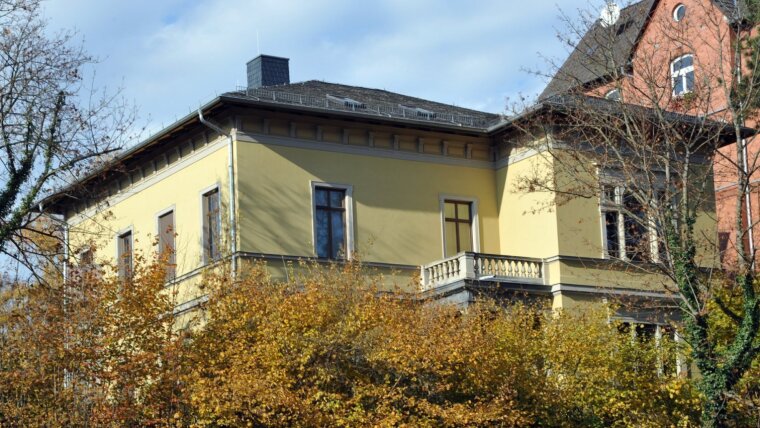
History of the Research Institution
The Ernst-Haeckel-Haus, built in the Italian country house style as a “Villa Medusa” in 1882-3, was the residence and workplace of the biologist Ernst Haeckel (1834-1919). To mark Ernst Haeckel’s centenary (2019), the building underwent a renovation and restoration in the years 2017-2021.
Today the Ernst-Haeckel-Haus is an institution of the Faculty of Biological Sciences. It houses the Chair for the History and Philosophy of Science, a museum and an archive
Guided tours are available on selected dates.
Information about the house tours can be found here.
Opening hours and guided tours
The Ernst-Haeckel-Haus can be visited on Thursdays from 2 p.m. to 6 p.m. without prior registration.
Special tours
Guided tours outside opening hours are possible by appointment. Please register by phone at +49 3641 - 9 49504 or by email at ernsthaeckelhaus[at]uni-jena.de, providing your name, contact details (phone number and email address), and the expected number of participants (max. 12 people per tour).
-
Historic Review
The Ernst-Haeckel-Haus with an “archive and exhibition” was founded on the 31st of October 1920 in the early years of the Weimar Republic. The first director was Haeckel’s student Heinrich Schmidt (1874-1935) who first published Haeckel’s letters in popular reader’s editions and edited his Gemeinverständliche Werke [Works for the Common Understanding]. He tried to make Haeckel an appealing figure to the National Socialist movement after Hitler took power. In his second biography, published in 1934 and entitled Ernst Haeckel. Denkmal eines großen Lebens [Ernst Haeckel. Monument to a Great Life], he writes that Haeckel’s “biological, nature-bound thought” underwent “a surprisingly powerful resurrection in the new Reich.”
The biographical and editorial work initiated by Schmidt was continued from 1935 by his successor, the zoologist Victor Franz (1883-1950). His professorship for biology came with the obligation to expand teaching to hereditary theory and the history of biology. Like Schmidt, he made efforts to stylize Haeckel as a precursor to National Socialism.
After the Second World War, the Ernst-Haeckel-Haus became affiliated with the university. Under the directorship of Georg Uschmann (1913-1986), its specialization in the history of biology was broadened to the history of science and in 1965 a Chair for the History of Science was established. 1971 saw the creation of a curator post to oversee the archive and museum. It was filled by Erika Krauße (1935-2003), who played a major role in shaping the scientific-historical reputation of the Ernst-Haeckel-Haus until her retirement in the year 2000. In her biographical work on Haeckel, she investigated his place in the history of biology and his influence on the art and architecture of his time. She had opened up the archive to users from Germany and from abroad already in the GDR era, thus providing sustainable support to international scholarly interest in Haeckel.
Under the directorship of Rüdiger Stolz, the existing university competences in the history of the individual natural sciences were brought together at the Ernst-Haeckel-Haus. The history of science was organized in a disciplinary fashion and consisted of the sum of the histories of the individual natural-scientific disciplines.
After German reunification the Ernst-Haeckel-Haus was transferred to the faculty of Biology and Pharmacy. Although resident at a faculty for the natural sciences, the directorship of Olaf Breidbach (1957-2014) approached the history of science from a cultural studies perspective. As a biologist and philosopher Breidbach called into question the claims of the natural sciences to objectivity and sought to relativize these in a (scientific-)historical fashion. He was particularly interested in the illustrative in Haeckel’s work as well as in his contribution to morphological thinking. He also founded the series Ernst-Haeckel-Haus-Studien Monographien zur Geschichte der Biowissenschaften und Medizin [Ernst Haeckel House Studies. Monographs on the History of the Biological Sciences and Medicine].
In the period from 1998 to 2010, the Ernst-Haeckel-Haus was involved in the special research project 482 “Ereignis Weimar-Jena. Kultur um 1800 [Event Weimar-Jena. Culture circa 1800]” Breidbach was its spokesperson from 2007 to 2010. A whole series of works on the relationship between the natural sciencesand natural philosophy at the turn of the 19th century were published in this period.